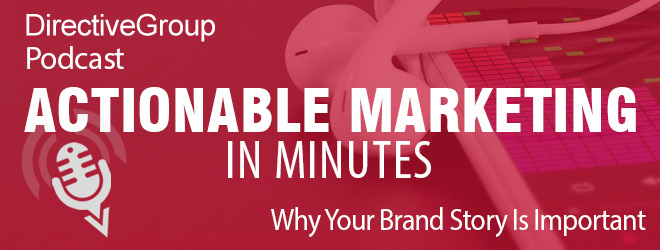In this episode of Actionable Marketing In Minutes we discuss your brand story and why it is important in B2B marketing.
Use the player below to listen to this episode, or the download link to load it on your device for listening later. You can also find our RSS feed by clicking here, or subscribe by email in the sidebar to the left.
Download our Social Media Marketing Best Practices Guide here!
Not able to listen? Why not read the episode transcript below:
Problem
Some folks are under the mistaken assumption that professional people should only present information in stodgy, mind-numbing ways, with very dry content and with lists and bullet points. We think people won’t take us seriously unless we’re – face it – unemotional. In other words, boring.
That couldn’t be further from the truth. Think about meetings you’ve attended. Which stand out to you? Those where you fought to stay awake or those whose presenters told an interesting story or two – uniting ideas and information with emotion – keeping you hungry for more?
It seems smaller companies, especially, are concerned that telling their story will come across as unprofessional. Again – not true. In fact, storytelling is a powerful marketing technique for building inspired and highly connected relationships. Remember: at the end of the day, you’re dealing with people. No matter what your marketing platform, you must capture your audiences’ attention and build those relationships. Plus, science has recently confirmed that NO thinking or decision making happens without an emotional component, and that emotions are crucial for memory. In other words, no emotion, no connection, no memory. Is that what you want for your brand?
Solution
The fact of the matter is that it is human nature to listen to stories. Stories make information tangible and real. Stories forge connections in the brain. Storytelling works because stories build memories. Here are some tips to use when writing your business story.
1. Use sensory language: When telling your story use details, create a plot and help the reader to see, hear, or feel what you want them to experience. Sensory language is used to make your story more realistic and descriptive. Your goal is to create a picture or an experience for your readers. Sensory language can help you do that.
2. Show, don’t tell: Similar to using sensory language, write your business story with words that show your audience what you are trying to communicate. Use images and quotation marks in your writing.
3. Add something new to the mix: One of the worst things you can do is tell a story that everyone has heard before. They will tune you out immediately and the whole purpose of your efforts will be lost. Try to take something that is familiar and merge it with something new. The familiar information gives them comfort while the new information or the new spin grabs their attention.
4. Find conflict: While we may try to avoid conflict in our own lives, it is a storyteller’s best friend. Conflict is a natural way to ignite emotion in the reader. The element of suspense requires a solution so it draws your reader into the story and makes them an active participant. And guess what? Active participation is a how we create memories!
Benefits
Bottom line, your brand story is a crucial marketing element, and in fact, is foundational. It takes a good amount of planning and hard work to craft a sincere and authentic story–but as the saying goes; No Pain, No Gain. The benefits are vast…
Remember, your audience really wants to connect with you. So if the story you’re sharing is genuine, authentic, and transparent, they will want to know more about you. But beware: insincerity can be spotted from afar. So, ensure you’re using the tone, voice, and communication style that your audiences value most. They will listen to what you have to say. Once your customers understand who you are, their loyalty will increase and they are better able to tell others about you.
We hope you’ve found this information helpful. Please connect with us on Twitter @DirectiveGroup or on LinkedIn. Let us know what you think and what you’d like to hear about next. And if you like our podcasts, please share with your networks using hashtag #actionablemarketing. Join us next time for an interview with one of our DirectiveGroup team members about how to create social media contests that actually work.
Podcast: Play in new window | Download (Duration: 5:59 — ) | Embed
